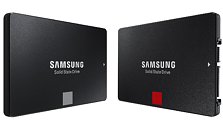Tuesday, January 23rd 2018

Samsung Officially Launches SSD 860 PRO and 860 EVO Series
Samsung Electronics America, Inc. today introduced the 860 PRO and 860 EVO solid state drives (SSDs), the most up-to-date additions to the company's SATA interface lineup. The products are aimed at consumers who require fast, reliable performance across various applications, from everyday computing to heavy workloads and graphic-intensive operations. Building on the successful launch of the 850 PRO and 850 EVO - the industry's first consumer SSDs with V-NAND technology - the 860 PRO and 860 EVO achieve industry-leading performance for SATA SSDs, offering enhancements in speed, reliability, compatibility and capacity.
"The new 860 PRO and 860 EVO SSDs combine the latest 512Gb and 256Gb 64-layer V-NAND, up to 4GB LPDDR4 mobile DRAM and a new MJX controller to elevate the user experience for both consumers and businesses," said Un-Soo Kim, senior vice president of Brand Product Marketing, Memory Business at Samsung Electronics. "Samsung will continue to fuel meaningful innovations in the consumer SSD space and drive growth of the overall memory industry for years to come."As file sizes continue to increase with high-resolution photos and 4K videos, the need for faster data transfers and sustainable high performance over a longer period of time has become paramount for users. To address this need, Samsung's 860 PRO and 860 EVO support up to 560 MB/s read and 530 MB/s write speeds and offer unmatched reliability with an upgraded five-year limited warranty, or up to 4,800 terabytes written (TBW) for the 860 PRO and up to 2,400 TBW for the 860 EVO. The new MJX controller also enables faster communication with the host system. The controller is powerful enough to handle workstation storage, while improving Linux operating system compatibility.
The 860 PRO is available in 256GB, 512GB, 1TB, 2TB and 4TB capacities, with the 4TB memory storage holding up to 114 hours and 30 minutes of 4K Ultra HD video. The 860 PRO is available in a widely compatible 2.5-inch form factor, which is ideal for PCs, laptops, workstations and NAS.
The 860 EVO comes in 250GB, 500GB, 1TB, 2TB and 4TB capacities, in a 2.5-inch for PCs and laptops, as well as mSATA and M.2 form factors for ultra-slim computing applications. The 860 EVO has up to six times longer sustained performance than its predecessor due to enhanced Intelligent TurboWrite technology, with read and write speeds of up to 550 MB/s and 520 MB/s, respectively.
The 860 PRO and 860 EVO SSDs are available from this month with manufacturer's suggested retail prices starting at $139.99 and $94.99 USD, respectively. For more information, visit the product page.
"The new 860 PRO and 860 EVO SSDs combine the latest 512Gb and 256Gb 64-layer V-NAND, up to 4GB LPDDR4 mobile DRAM and a new MJX controller to elevate the user experience for both consumers and businesses," said Un-Soo Kim, senior vice president of Brand Product Marketing, Memory Business at Samsung Electronics. "Samsung will continue to fuel meaningful innovations in the consumer SSD space and drive growth of the overall memory industry for years to come."As file sizes continue to increase with high-resolution photos and 4K videos, the need for faster data transfers and sustainable high performance over a longer period of time has become paramount for users. To address this need, Samsung's 860 PRO and 860 EVO support up to 560 MB/s read and 530 MB/s write speeds and offer unmatched reliability with an upgraded five-year limited warranty, or up to 4,800 terabytes written (TBW) for the 860 PRO and up to 2,400 TBW for the 860 EVO. The new MJX controller also enables faster communication with the host system. The controller is powerful enough to handle workstation storage, while improving Linux operating system compatibility.
The 860 PRO is available in 256GB, 512GB, 1TB, 2TB and 4TB capacities, with the 4TB memory storage holding up to 114 hours and 30 minutes of 4K Ultra HD video. The 860 PRO is available in a widely compatible 2.5-inch form factor, which is ideal for PCs, laptops, workstations and NAS.
The 860 EVO comes in 250GB, 500GB, 1TB, 2TB and 4TB capacities, in a 2.5-inch for PCs and laptops, as well as mSATA and M.2 form factors for ultra-slim computing applications. The 860 EVO has up to six times longer sustained performance than its predecessor due to enhanced Intelligent TurboWrite technology, with read and write speeds of up to 550 MB/s and 520 MB/s, respectively.
The 860 PRO and 860 EVO SSDs are available from this month with manufacturer's suggested retail prices starting at $139.99 and $94.99 USD, respectively. For more information, visit the product page.

13 Comments on Samsung Officially Launches SSD 860 PRO and 860 EVO Series
Not bad, but as expected it's limited by the drive interface.
M.2 is rubbish for high capacity because everything is stupid expensive or doesn't even come in 2TB capacities. It's why I ended up with SATA even though I could stick a M.2 drive in it.
As for SSD's, impressive as always. These 960 drives have insane write endurance. 850 was excellent at stated 300TBW and actual around 1 PBW, but these are just crazy. 4.8 PBW WTF!? :D
With SATA Express, they could easily make 2TB and 4TB formats while delivering higher speeds to interfaces basically all motherboards to date support. Not that I need sequential that much but still, you'd at least have an option.
This is a new drive and I want to see new reviews for the correct drive.
Anyone know how to fix this?
www.newegg.com/Product/ProductList.aspx?Submit=ENE&N=100011693 50001077 8000&IsNodeId=1&srchInDesc=860&page=1&bop=And&order=BESTMATCH
Drop in warranty period from 5Year850 to 3year860. look at: 2TB, 4TB.
This, "well the 850 is close enough" shit is just that., SHIT.
How about a stab at accuracy.
I want new 860 owner reports. Is Newegg going to fix this?
If you work for Newegg or Samsung, fix it.
We have a test box with:
a) 256 GB Samsung 850 Pro
b) 2 TB 7,200 rpm SSHD
a) 2 TB 7,200 rpm HD
The OS was installed on the 1st partition of each device, and boot drive was changed via BIOS w/o the user's knowledge. The 5 user's were told the performance issues were observed on the box, since fixed, and to report any issues if they reoccur. After 6 weeks ... no one noticed except for one instance where a user said, (HD Boot), that booting seemed to take longer today but wasn't sure.
Test was repeated ith two otherwise identical laptops, one with SSD + 7200 rpm HD and the other with SSHD ... again, no one noticed. I liken it to those pictures in the newspaper where they show two images and ask you to fond the 6 things "that are different" ... unless ya spend the time focusing on it, you would never know there was a difference. When discussing with colleagues, the "proof" offered has ranged from copying terabytes of data to starting windows and having Chrome open 100 windows, benchmarks and things that can hardly be said to be "everyday tasks". So we can all sit at our desks sitting there content that "it's faster' but it's not as if, again for most of us, that it has an impact on our lives.
No legal secretary is typing an extra brief before she goes home because she has an SSD
No game is reaching an extra checkpoint because they have an SSD
Test Box results:
Boot to Windows
SSD = 15.6 seconds
SSHD = 16.5 seconds
HD = 21.2 seconds
Open Large AutoCAD file
SSD = 28 seconds
SSHD = 28 seconds
HD = 28 seconds
Start MMO to point where Character can move
SSD = 44.5 seconds
SSHD = 44.5 seconds
HD = 44.5 seconds
With AutoCAD was a day where we could justify spending $1,000 on a 1 GB SCSI drive as back in the 90s, AutoCAD was much more disk intensive ... today not so much... as for the MMO, the obvious bottle neck here is the download time getting character data off server. And yes, of course there are other things we can do, that do show differences. Bit running an MS office Script is not one of them ... while the SSD shows a distinct advantage here, when ya add in the fact that between each line of script in that benchmark, a user must hit one or more keys, the bottleneck here is the user.
I played Witcher 3 off SSHD and can't say that my experience might have chnaged much if it was all on the SSD. But I did monitor one thing ... what I did . When I'd quit work and switch to relaxation time, I'd boot the game ... then run off for a quick bio or snack. Game was always ready to go when I got back. When I ported from region to region, I was on second screen opening maps, spreadsheets of unfinished quests that again, the game was ready before I was.
Being a geek w/ disposable income, of course I have SSDs, bit more because "it's there" to be had rtaher than any perceived life changing experience. I've done cost benefit analyses and even today, it certainly is not going to pay for itself with improved productivity ... at least outside very specific market niches (rendering, video editing, etc). But if a user is asking for build advice and it's between a x60 GFX card with SSD and a x70 w/ SSHD, I am oft disappointed seeing a preference for the SSD; don't see the SSD / x60 combo as being in the game. The SSD is an easy upgrade later on ... the GFX card swap not so much.